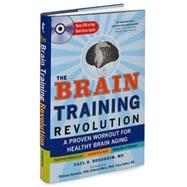
| Acknowledgments | p. v |
| Introduction-You Are Your Brain | p. ix |
| Getting Up to Speed on Your Aging Brain | p. 1 |
| The Three-Pound Universe | p. 3 |
| Making Memories | p. 21 |
| New Thinking on Thinking: The Young Brain, the Old Brain, and the Better Brain | p. 33 |
| A Brain-Healthy Lifestyle | p. 49 |
| The Brain Training Revolution | p. 51 |
| Food for Thinking | p. 61 |
| Body Moves to Grow and Strengthen Your Brain | p. 93 |
| Because Gray Matters: Daily Workouts in the World Brain Gym! | p. 139 |
| Stress Busters | p. 237 |
| The Night Shift: Sleep Your Way to Bedrock Memories | p. 255 |
| Conclusion: Your Brain's Future | p. 267 |
| Resources | p. 271 |
| Nutritional Quotient Scorecards | p. 273 |
| Answers to the Exercises | p. 276 |
| Recommended Resources for Readers | p. 292 |
| Notes | p. 300 |
| References | p. 311 |
| Recipes | p. 312 |
| Index | p. 322 |
| Table of Contents provided by Ingram. All Rights Reserved. |
The New copy of this book will include any supplemental materials advertised. Please check the title of the book to determine if it should include any access cards, study guides, lab manuals, CDs, etc.
The Used, Rental and eBook copies of this book are not guaranteed to include any supplemental materials. Typically, only the book itself is included. This is true even if the title states it includes any access cards, study guides, lab manuals, CDs, etc.